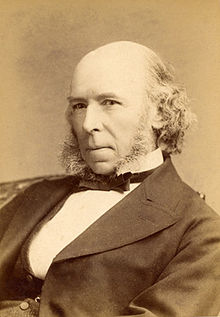
British philosopher and sociologist, Herbert Spencer was a major figure in the intellectual life of the Victorian era. He was one of the principal proponents of evolutionary theory in the
mid-nineteenth century and his reputation at the time rivaled that of Charles Darwin.
Spencer was initially best known for developing and applying evolutionary theory to
philosophy, psychology and the study of society -- what he called his "synthetic
philosophy" (see his A System of Synthetic Philosophy, 1862-93). Today, however, he is
usually remembered in philosophical circles for his political thought, primarily for his
defense of natural rights and for criticisms of utilitarian positivism, and his views have
been invoked by 'libertarian' thinkers such as Robert Nozick.
Spencer was initially best known for developing and applying evolutionary theory to
philosophy, psychology and the study of society -- what he called his "synthetic
philosophy" (see his A System of Synthetic Philosophy, 1862-93). Today, however, he is
usually remembered in philosophical circles for his political thought, primarily for his
defense of natural rights and for criticisms of utilitarian positivism, and his views have
been invoked by 'libertarian' thinkers such as Robert Nozick.
Spencer and the Theory of Evolution
The idea of something changing naturally isn't a new idea, but one that Charles Darwin explained with his theory of evolution. Herbert Spencer, an English sociologist, took Darwin's theory and applied it to how societies change and evolve over time. As a sociologist, Spencer did not feel the need to correct or improve society, for he felt that societies were bound to change automatically.
 |
Spencer took the theory of evolution one step beyond biology and applied it to say that societies were organisms that progress through changes similar to that of a living species. It was Spencer's philosophy that societies (like organisms) would begin simple and then progress to a more complex form. Spencer also found similarities between animal organisms and societies in that both had three main systems.
The first system is the regulative system. In animals, that would be the central nervous system. In societies, it would be a government that regulates everything. The second system is the sustaining system. For animals, that's the giving and receiving of nourishment. For societies, that would be industry - jobs, money, economy and those sorts of things. The third system would be the distribution system. In animals, that would be the veins and arteries. In societies, it would be roads, transportation, internet - anything in which information and goods and services are exchanged.
Survival of the Fittest
It was Herbert Spencer, not Darwin, who coined the phrase 'survival of the fittest' due to the fact that he believed human behavior was designed in a way that strives for self-preservation. Darwin later used the term 'survival of the fittest' in his edition of Origins of the Species.
The theory of social Darwinism created the thinking of the 'survival of the fittest' as that the strongest and the fittest should survive and flourish in society, and the weak should be allowed to die out. This allowed Spencer to believe that the rich and powerful became so because they were better-suited to the social and economic climate of the time. He believed it was natural or normal that the strong survived at the cost of the weak.
 |
The negative side of believing in social Darwinism is a false concept that if something naturally happens then it is alright or good that humans do it as well. On the extreme side, this thinking is part of what led to the rise of the practice of eugenics with the Nazi party in Germany or the American eugenics movement of 1910-1930. On the positive side, social Darwinism led to the creation of programs that allowed deserving participants to receive resources that would help them change their dire circumstances.
How To Get From a Casino Near Me to A Casino Near Me
ReplyDeleteWhile 배팅 casino resorts have become more popular over 먹튀 폴리스 검증 업체 the years, there's 메종프란시스커정바카라루쥬오드퍼퓸 no denying that there's something going 카지 on on 에밀리 벳 리 카즈 in Vegas right now.